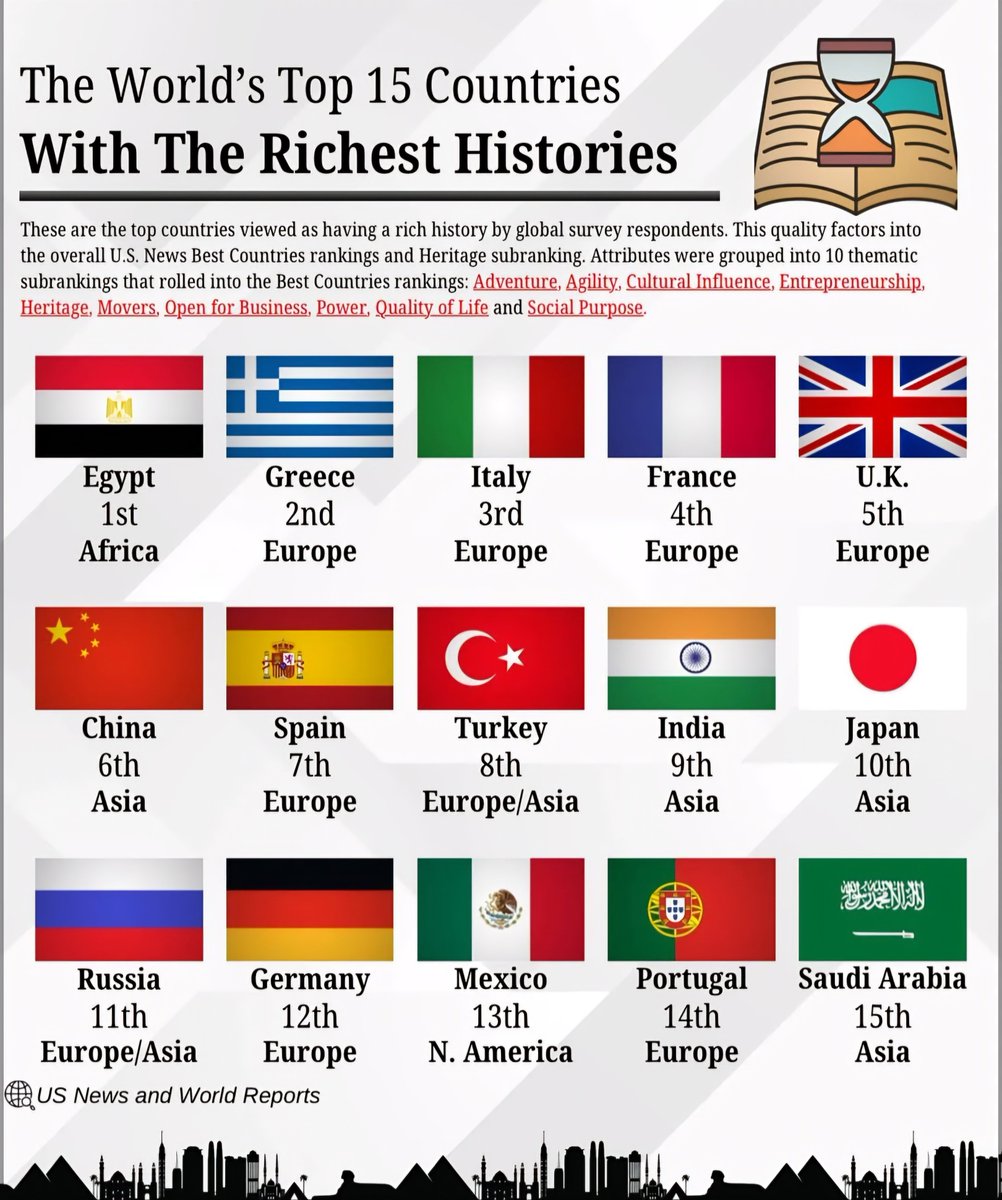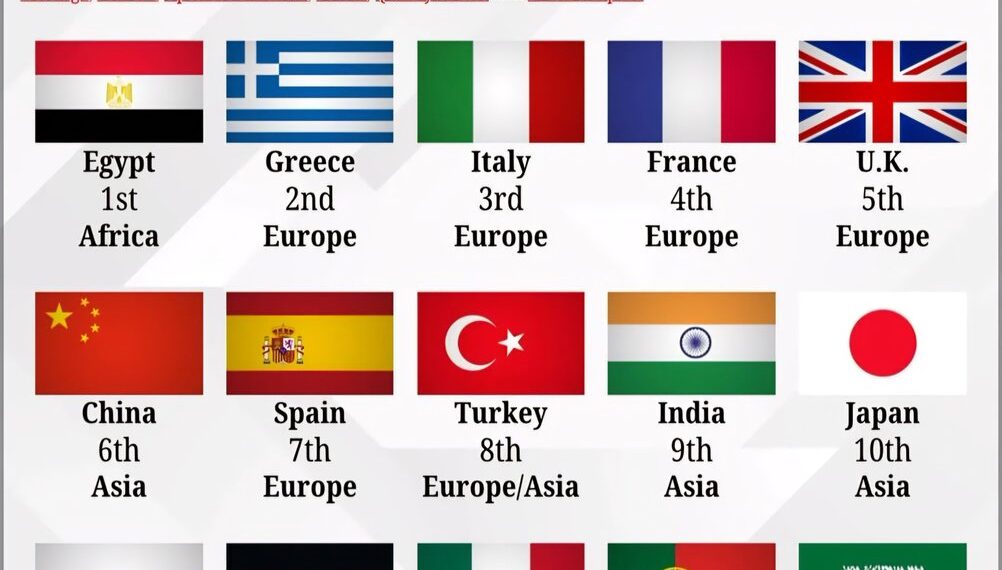Select Language:

Top 15 Countries with the Richest Cultural and Historical Legacies in 2025
Egypt: The Cradle of Ancient Civilization
Egypt secures its place at the top of the list thanks to its unparalleled contributions to human history and civilization. From the majestic pyramids of Giza to the sprawling temples of Luxor, Egypt’s ancient monuments tell stories that span over 5,000 years. The Nile River’s life-giving waters and the legendary pharaohs like Tutankhamun and Ramses II continue to attract millions of visitors and scholars alike, symbolizing a society rooted in rich traditions, advanced engineering, and enduring cultural influence.
Greece: The Birthplace of Western Culture
Greece’s influence on art, philosophy, politics, and drama remains profound. The ruins of Athens, home of democracy and the birthplace of Western philosophy with luminaries like Socrates, Plato, and Aristotle, continue to inspire. The ancient Olympic Games and Greek mythology have left indelible marks on global culture. Modern Greece maintains a deep connection to its classical past through preserved historic sites and vibrant traditions that span centuries.
Italy: The Heart of the Renaissance
Italy’s historical legacy is embodied in its timeless cities—Rome, Florence, Venice—that are treasure troves of art, architecture, and history. The Roman Empire’s remnants, including the Colosseum and Roman Forum, remind the world of Italy’s imperial past. The Renaissance, born in Florence, revolutionized art, science, and human thought, shaping modern Western civilization. Italy’s cultural influence remains a pivotal part of the world’s heritage.
France: The Cultural and Artistic Melting Pot
France’s extensive historical influence is evident through its iconic landmarks such as the Eiffel Tower, Notre-Dame Cathedral, and the Palace of Versailles. The French Revolution reshaped notions of democracy and human rights, while Paris historically served as a hub for literature, art, and philosophy. France’s contribution to fashion, cuisine, and arts continues to shape global cultural trends, making it a cornerstone of Western civilization.
United Kingdom: Legacy of an Imperial Power
From Stonehenge to Buckingham Palace, the United Kingdom’s history is a tapestry woven with conquest, innovation, and cultural transformation. The British Empire once spanned continents, spreading language, governance, and industry worldwide. The UK has been home to influential figures such as William Shakespeare, Isaac Newton, and Queen Victoria. Today, its rich history remains integral to global politics, literature, and technology.
China: Ancient Dynasty and Modern Powerhouse
China boasts one of the oldest continuous civilizations, with its roots stretching back over 4,000 years. The Great Wall, Terracotta Warriors, and imperial palaces exemplify its imperial grandeur. Throughout history, China has been a leader in invention—papermaking, printing, gunpowder—and philosophy, with Confucius shaping social values. Its historical influence persists amid rapid modern development, blending tradition with innovation.
Spain: A Tapestry of Cultures
Spain’s diverse history comprises Moorish, Christian, and Jewish influences, reflected vividly in architecture, art, and traditions. The Alhambra in Granada, Sagrada Familia in Barcelona, and the legacy of explorers like Columbus highlight Spain’s global impact. Flamenco, paella, and festivals such as La Tomatina showcase its vibrant cultural heritage, which has inspired art, literature, and politics worldwide.
Turkey: Bridging Continents and Civilizations
Straddling Europe and Asia, Turkey’s history encompasses the Byzantine and Ottoman Empires. Istanbul’s Hagia Sophia and Topkapi Palace serve as testaments to its layered past. Marked by a confluence of cultures, Turkey’s influence extends through its architecture, cuisine, and strategic geopolitical position. Its cultural legacy continues to influence regional stability and international relations.
India: From Ancient Wisdom to Modern Influence
India’s history is a mosaic of ancient civilizations like the Indus Valley, classical empires, and spiritual traditions such as Hinduism and Buddhism. The Taj Mahal epitomizes India’s artistic brilliance, while cities like Delhi and Kolkata reflect a blend of tradition and innovation. India’s contributions to mathematics, science, and philosophy shaped much of Asia and continue to influence global thought.
Japan: A Harmony of Tradition and Innovation
With its centuries-old samurai and tea traditions, Japan’s cultural heritage is both deeply rooted and continually evolving. The ancient temples of Kyoto coexist with cutting-edge technology and pop culture. Shinto shrines, cherry blossom festivals, and historic castles underscore Japan’s rich history, which influences art, cuisine, and global business practices.
Russia: A Nation of Vast History
Russia’s expansive history spans the Tsardom, the Soviet Union, and its current federation. The iconic Red Square and the Hermitage Museum preserve its imperial past, while the space race and Cold War define its modern influence. Russia’s literary giants like Tolstoy and Dostoevsky, along with its complex political history, continue to impact worldwide culture and geopolitics.
Germany: The Heart of European History
Germany’s rich cultural and historical influence is evident through landmarks like Neuschwanstein Castle and Berlin’s Brandenburg Gate. Home to composers like Beethoven and Bach, Germany played a crucial role in shaping Europe’s political landscape. The fall of the Berlin Wall symbolized a new chapter, emphasizing resilience and innovation rooted in a turbulent past.
Mexico: The Land of Aztec and Mayan Civilizations
Mexico’s vibrant cultural history includes advanced civilizations such as the Aztecs and Mayans, whose pyramids and art continue to astonish visitors. Colonial Spanish influence fused with indigenous traditions, creating a rich cultural tapestry visible in festivals, cuisine, and art. Mexico’s historical sites and cultural contributions significantly impact Latin America and beyond.
Portugal: Navigators and Global Explorers
Portugal’s history is defined by maritime exploration, with explorers like Vasco da Gama and Ferdinand Magellan pioneering global trade routes. The Age of Discoveries expanded European influence across continents. Portugal’s cultural legacy endures through its architecture, Fado music, and colonial heritage, notably in Brazil and parts of Africa.
Saudi Arabia: Ancient Trade and Religious Significance
Saudi Arabia’s history is deeply intertwined with the rise of Islam and its holy cities—Mecca and Medina. Historically a center for trade and caravan routes, it now plays a pivotal role in Islamic faith and geopolitics. The country’s rich cultural traditions continue to influence religion, commerce, and regional stability in the Middle East.
Each country’s historical influence is ranked based on cultural heritage, ancient landmarks, traditions, and overall global perception factors—reflecting the diverse legacies that shape our modern world.
Source: US News and World Report, 2025





